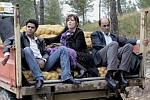 Shadows off the beaten path
Shadows off the beaten pathTO GET TO HEAVEN FIRST YOU HAVE TO DIE | TOKYO!
< < F O R E I G N > >
last update 26.Nov.08
See also: SHADOWS FILM FESTIVAL
 R E V I E W B Y R I C H C L I N E
R E V I E W B Y R I C H C L I N E Parlez-Moi de la Pluie
Parlez-Moi de la Pluie
scr Jean-Pierre Bacri, Agnès Jaoui
with Agnès Jaoui, Jean-Pierre Bacri, Jamel Debbouze, Pascale Arbillot, Guillaume De Tonquedec, Frédéric Pierrot, Mimouna Hadji, Anne Werner, Florence Loiret-Caille, Laurent Jarroir, Marc Betton, Bernard Nissile
 release Fr 17.Sep.08,
release Fr 17.Sep.08, US Oct.08 nyff,
UK 7.Nov.08
08/France StudioCanal 1h40

 There are several intriguing themes gurgling around this comical drama, but it's so rambling and loose that nothing really comes together. Even so, the solid acting keeps us interested, and the potent issues keep us thinking.
There are several intriguing themes gurgling around this comical drama, but it's so rambling and loose that nothing really comes together. Even so, the solid acting keeps us interested, and the potent issues keep us thinking.
Karim (Debbouze) is a film school grad who teams up with his teacher Michel (Bacri) to make a documentary about local political candidate Agathe (Jaoui), who Karim knows from childhood, as his mother Mimouna (Hadji) was her family maid. The interviews take place at the country house where Mimouna now works for Agathe's sister Florence (Arbillot), who as it happens is thinking of leaving her husband (De Tonquedec) for Michel. But these people are bundles of concealed racism and sexism.
As filmmakers, Jaoui and Bacri keep the tone light and relaxed, even when tackling serious themes and heavy drama. Their main gimmick is to keep everyone talking about everything besides what really concerns them. The problem is that this has the effect of making the movie feel extremely talky and random; even Agathe's to-camera interviews are dense and subliminal. As a viewer we just wish someone would get to the point and stop being so self-absorbed.
On the other hand, this approach also allows the cast and filmmakers to dig into extremely strong issues by examining the characters' underlying prejudice and arrogance. In this case, the main focus is Michel's rampant self-importance and the way Karim is talented but overlooked. Bacri and Debbouze play these roles perfectly, but the mere fact that Michel is such a jerk and Karim is so passive makes them difficult to like. And other characters are equally human.
Meanwhile, the filmmakers indulge in high farce and slapstick sequences that stretch credibility, but at least allow for a glimpse of the truth that these narrow attitudes are shared by people regardless of economic status, upbringing, race or gender. The ultimate message here is that, with our personal weaknesses, it's a miracle anyone manages to form a relationship, and yet without each other we're all adrift. A clever idea that could have been stronger with a bit more focus.
6.Jul.08
 R E V I E W B Y R I C H C L I N E
R E V I E W B Y R I C H C L I N E Les Liens du Sang
Les Liens du Sang
scr Jacques Maillot, Eric Veniard, Pierre Chosson
with Guillaume Canet, François Cluzet, Clotilde Hesme, Marie Denarnaud, Hélène Foubert, Eric Bonicatto, Olivier Perrier, Carole Franck, Cyril Couton, Pierre Pellet, Luc Thuillier, Marie Gili-Pierre
 release Fr 6.Feb.08,
release Fr 6.Feb.08, UK 5.Dec.08
08/France StudioCanal 1h46

 Gritty and tough, this period thriller about brothers on opposite sides of the law has remarkably complex characters and a vivid sense of style. Despite a choppy approach, it really grapples with some strong moral dilemmas.
Gritty and tough, this period thriller about brothers on opposite sides of the law has remarkably complex characters and a vivid sense of style. Despite a choppy approach, it really grapples with some strong moral dilemmas.
In 1979 Lyon, police inspector Francois (Canet) is nervous that his brother Gabriel (Cluzet) is being released from prison after 10 years. But Gabriel wants to stay clean, so Francois helps him settle into his new life, where he meets a nice girl (Denarnaud). Although this raises fears from his past. Meanwhile, Francois starts seeing the wife (Hesme) of an imprisoned colleague. Soon he and Gabriel are deeply entangled in each others' lives. Or maybe it's a collision course.
The film cleverly recreates the 1970s with realistic situations and settings in which the actors deliver honest, gut-level performances. And this is especially intriguing since all of them are fairly cold, refusing to show emotions (even the sex feels earthy and rutting). This makes them rather difficult to identify with, even though we are gripped by their interaction and their story. Especially as Gabriel finds himself pushed back into his old criminal partnerships. And Francois finds himself slipping as well.
Structurally, the film jumps roughly from scene to scene, including numerous flashbacks in which we're not quite sure who's who. Even so, the film's central theme emerges sharply: it's virtually impossible to get a fresh start in life, because no one will let you. And in portraying characters who are essentially unable to control their lives at all, Canet and Cluzet are hugely effective. When Gabriel says, "You're always on the right side, but never on mine," we feel the pang too.
In the final act, director-cowriter continues to jar us with his cross-cutting, filling in details through details that change our perception of the action. And as it cranks up to another big showdown between the good cop and his dodgy brother, the various plot threads finally converge to make a potent comment on the real cost of doing the right thing, if there is such a thing. We're a bit worn out by this time, but it still has a strong kick.
26.Sep.08
 R E V I E W B Y R I C H C L I N E
R E V I E W B Y R I C H C L I N E
with Khurshed Golibekov, Dinara Droukarova, Maruf Pulodzoda, Djonibek Mourodoc, Shakhnosa Khodjaeva, Davron Alimatov, Olga Kovaleva, Fatkhullo Abdulloev, Natalia Fedotova, Khairi Burieva, Munisa Ganieva, Malika Baratova

release UK 28.Nov.08
06/Tajikistan 1h35
CANNES FILM FEST
TORONTO FILM FEST
 There's a low-key, natural tone to this Tajik drama from gifted filmmaker Usmonov (ANGEL ON THE RIGHT). It's a bit vague and grim, but also gripping as we follow a young man on a strange voyage of self-discovery.
There's a low-key, natural tone to this Tajik drama from gifted filmmaker Usmonov (ANGEL ON THE RIGHT). It's a bit vague and grim, but also gripping as we follow a young man on a strange voyage of self-discovery.
At age 19, Kamal (Golibekov) hasn't yet managed to lose his virginity with his wife. His doctor says there's nothing wrong so, instead of going home, Kamal decides to stay in the city with his womanising pal Said (Mourodoc). He begins to follow random women around town and eventually meets Vera (Droukarova). The big surprise back in her flat is that she's married to a man (Pulodzoda) who refuses to let Kamal go, pressing him into service as his assistant on a series of mob-based burglaries.
Despite the setup and a blackly comical tone, this is far from the usual teen sex movie. Usmanov films with long, observational takes, as the camera rarely strays from Kamal's face, catching tiny glances and not-so-accidental touches. There's an overwhelming sense of Kamal's quiet desperation and hopeful yearning. And Golibekov is eerily effective as he never quite lets us in; we don't know what Kamal wants from this odyssey, only that he refuses to give up, even when his quest takes some seriously freaky turns.
The pivotal moment seems to reinforce the worst kind of primitive machismo (hint: it involves a shotgun), even as everything else undermines it. Unlike Said and Vera's husband, Kamal isn't a tough guy, although he's also far too aloof to call sensitive. The only person in the film who generates real emotional resonance is Vera, and as her story reveals itself, it tells us just as much about this bleak society as Kamal's awkward journey.
What makes all of this watchable is Usmanov's skill with the camera, layering in waves of dark humour and implied quirkiness. Visually, the film is lyrical and smooth, even as it turns extremely creepy. Kamal and Vera are both soft and beautiful on screen--young, naive, engaging--and yet each has a steely toughness under the surface. We're never quite sure what their demons are, but it's fascinating to see them find difficult, inventive ways to deal with them.
16.Nov.08
 R E V I E W B Y R I C H C L I N E
R E V I E W B Y R I C H C L I N E
dir Michel Gondry
scr Gabrielle Bell, Michel Gondry
with Ayako Fujitani, Ryo Kase, Ayumi Ito, Nao Omori
Merde
dir-scr Leos Carax
with Denis Lavant, Jean-François Balmer, Renji Ishibashi, Julie Dreyfus
Shaking Tokyo
dir-scr Bong Joon-ho
with Teruyuki Kagawa, Yu Aoi, Naoto Takenaka, Hiroshi Yamamoto
 release Jpn 16.Aug.08,
release Jpn 16.Aug.08, UK Oct.08 lff,
US 5.Dec.08
08/Japan 1h52
CANNES FILM FEST

 Surreal, scary and funny, this collection of three short films brings the Japanese monster movie into the 21st century with wit and invention, plus a lot of skill from three top filmmakers.
Surreal, scary and funny, this collection of three short films brings the Japanese monster movie into the 21st century with wit and invention, plus a lot of skill from three top filmmakers.
First is Gondry's Interior Design, in which young couple Akira and Hiriko (Kase and Fukitani) travel to the big city to stay with their friend Akemi (Ito) in her tiny apartment while they find jobs. Aspiring filmmaker Akira soon finds work wrapping gifts, but the slacker Hiriko must undergo a bizarre transformation to find her place in the world. As usual, Gondry approaches the story with a breezy familiarity, using offhanded camera angles, clever shooting techniques and seamless effects to ground an imaginative fantasy in real life. There's also a strong sense of emotion, as these characters struggle to find their singular paths in life as the whole city seems to conspire against them.
Next is Carax's Merde, a dark, freaky tale about the Creature from the Sewers, a seemingly disjointed, one-eyed redhead (Lavant) who emerges from a manhole to wreak havoc on city shoppers with some old WWII hand grenades. He's arrested and tried, and his French lawyer (Balmer) is the only person on earth who can understand his language and his soul. There's a clear sense here that society is reaping what it sowed in the past. Old troubles don't stay buried; they come back with a vengeance, are framed as a new threat and are dealt with for maximum political leverage. Sound familiar? Fortunately, Carax also takes the time to develop the characters, constantly catching us off guard with silly humour and raw emotion. And it's gorgeously filmed with bristly textures, dark colours and provocative editing.
Finally, Bong's Shaking Tokyo starts as an intriguing monolog about a hermit (Kagawa) who's been holed up in his house for 10 years, never even looking a delivery person in the eye. Blink and it's 11 years, and he accidentally crosses glances with the pizza girl (Aoi), which sparks a literal earthquake of change in both his world and everyone else's. Again, there's a fable-like quality that forces us to examine modern urban society in which people live in close proximity yet barely interact. With his sharp cinematic skills, Bong beautifully draws us into this lonely, warmly lit world and keeps us gripped to the small but potent story.
As a triptych, this film is thoroughly entertaining, since it works as both a series of hysterical thrillers and also on various other levels. The production values are first-rate in all three segments, each with a very different tone and carrying its director's unique perspective. And the casts are superb as well, really diving into their characters to create more meaning in 40 minutes than most big movies can manage in two hours.
21.Oct.08 lff


See also: SHADOWS FILM FESTIVAL
© 2008 by Rich Cline, Shadows
on the Wall